Town halls contacted by AyiboPost cite potential for corruption, and structural problems such as lack of equipment and non-payment of employees
On Monday, May 20, 2024, the Presidential Council announced the launch of a sanitation operation in the capital and its surroundings to “clean and beautify” the streets. A billion gourdes is planned for this purpose.
But no officials from the three town halls contacted by AyiboPost seem to have any information on the management of this budget.
The mayor of Port-au-Prince, Lucsonne Janvier, reports that, during previous sanitation operations, the State used MonCash to pay contract workers.
But the problem with this method, according to magistrates in Port-au-Prince and Tabarre, is that often the people who receive the money have nothing to do with sanitation.
To avoid any scandals, Lucsonne Janvier says town halls find themselves having to dip into their own funds to pay people who were not paid even though they worked on the program.
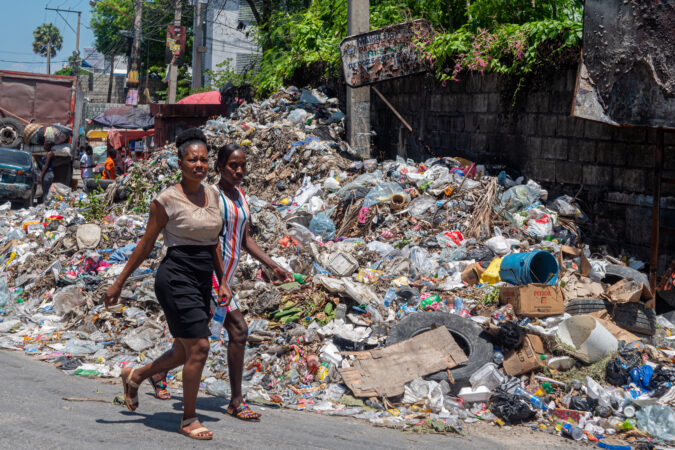
Two people walk near a pile of garbage, not far from the Ministry of Culture and Communication, in Port-au-Prince, May 2024.| © Carvens Adelson/AyiboPost
Magistrate Lucsonne Janvier also complains about private companies that collect waste from their customers’ homes, only to dispose of it in the streets.
Like the town hall employees, these companies cannot reach landfills sites due to insecurity.
Along with town halls, the National Solid Waste Management Service (SNGRS) and the Ministry of Public Works, Transport and Communications (MTPTC), are involved in the waste management issue on public roads.
Each of these institutions has a well-defined role.
“Town halls collect waste,” says Nice Simon, mayor of the town of Tabarre. “The SNGRS, which has a budget allocated to this, has the responsibility of picking them up. The Ministry of Public Works is there to clean the canals,” she explains.
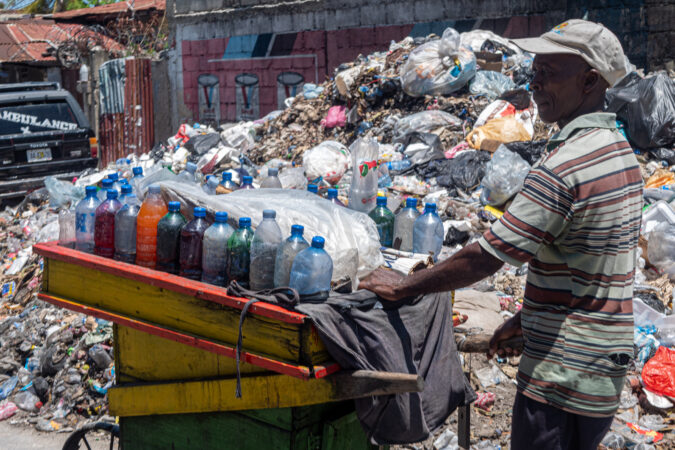
A shaved iced (fresko) seller passes near a pile of waste in Bois-Verna, at the entrance to Rue Milfort, in May 2024.
Specializing in garbage collection, the SNGRS could very well clean the streets on its own, according to Joseph David, an employee of the organization. The problem is that the workers are on strike.
“We have not been paid our back wages for three years now,” he denounces. With several dozen other employees of the institution, the forty-year-old placed barricades on the road in front of the institution, the day after the announcement of the sanitation project.

Employees of the SNGRS erected barricades on the road in front of the institution starting on May 21, 2024, the day after the Presidential Council’s sanitation project was announced. | © Jean Feguens Regala/AyiboPost
These workers hope to put pressure on the Presidential Council in order to be paid and for the entire administrative team they accuse of corruption to be fired.
“It’s always like this whenever there is money at stake,” says Marie Claude, a truck driver. “We are the ones who are going to do the dirty work, but we won’t see a nickel if they are the ones who have to manage it,” she says.
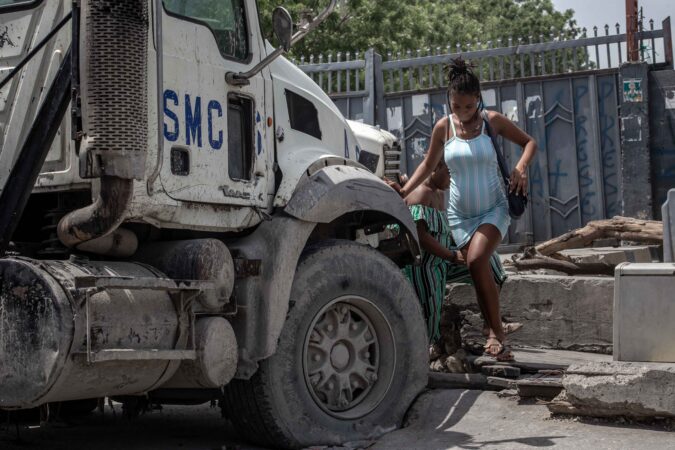
Pedestrians are forced to find a way through due to road blockages by striking SNGRS employees on May 21, 2024. | © Jean Feguens Regala/AyiboPost
Added to this problem are those concerning equipment.
Whether at the level of town halls or the SNGRS, the number of dysfunctional equipment, burned or in territory controlled by gangs remains considerable.
Some, like those belonging to the SNGRS, need repairs estimated at around 15,000 gourdes, according to Joseph David, one of the drivers of heavy machinery encountered on site on May 21, 2024.
“Money for their maintenance is regularly disbursed,” he says, “but it is never used for this purpose.”
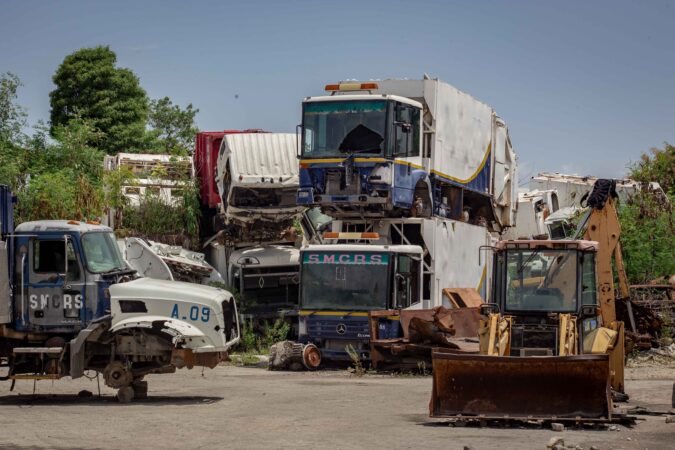
Heavy machinery or equipment broken down in the SNGRS garage is being demolished. | © Jean Feguens Regala/AyiboPost
The vast majority of these materials date from Jan. 2010, according to two other employees interviewed by AyiboPost.
Already, the materials are few in number.
Nice Simon has less than 10 heavy-duty machines to manage waste over the 24.47 square kilometers of his municipality. “There are four dump trucks, a bobcat, a loader, a small roller and two compressive trucks,” he says.
The figures are worse for the town hall of Port-au-Prince.
According to Blanguy Michel Billy, the assistant head of the town hall’s roads department, there is « a single dump truck, two compressors and a box truck » to treat waste in the municipality of Port-au-Prince.
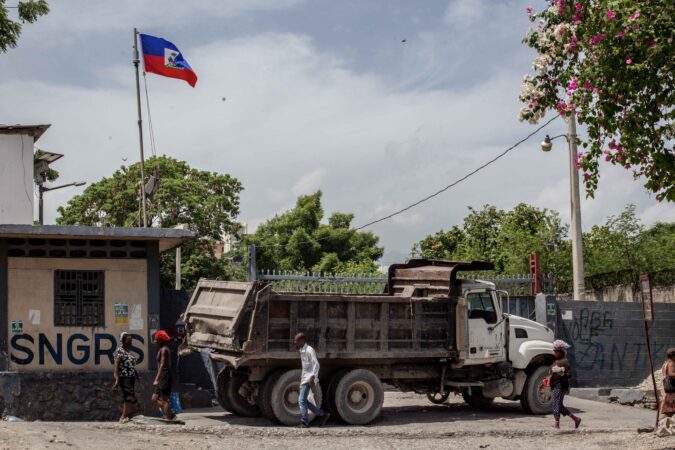
SNGRS employees are blocking the entrance to the institution’s premises. | © Jean Feguens Regala/AyiboPost
Because the glaring insecurity ravaging the country seems to have a greater impact on the unsanitary conditions of the streets, several executives from the institutions concerned believe that it must be resolved so that sanitation can succeed.
“I have no problem with the project,” emphasizes Bien-Aimé Pierre Marie Lafont. Waste is also part of insecurity. “But I don’t think that’s what we need right now,” he says.
The head of the roads service at the Delmas town hall is worried about the neighborhoods now elevated, he says, to the rank of “lost territories” by a former minister of justice.
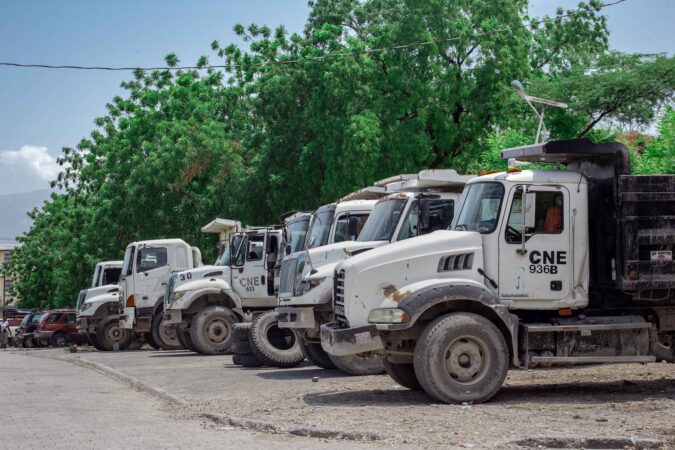
Almost all CNE trucks have left the institution’s site in Drouillard to park at the SNGRS due to insecurity in Cité Soleil. | © Jean Feguens Regala/AyiboPost
These locations are not without risk for employees who will participate in the campaign.
Mobilizing the police and the army would risk further exposing employees, according to the mayor of Port-au-Prince, who declares that he no longer has the same confidence in the police.
The State and town halls have never really had the same vision when it comes to sanitation, according to the magistrate of Port-au-Prince, Lucsonne Janvier.
“Beyond the helping hand that it intends to give to town halls, the State still sees sanitation as a means to resolve political problems,” analyzes Janvier.
According to him, politicians in power often use these moments to satisfy figures to whom they are beholden.
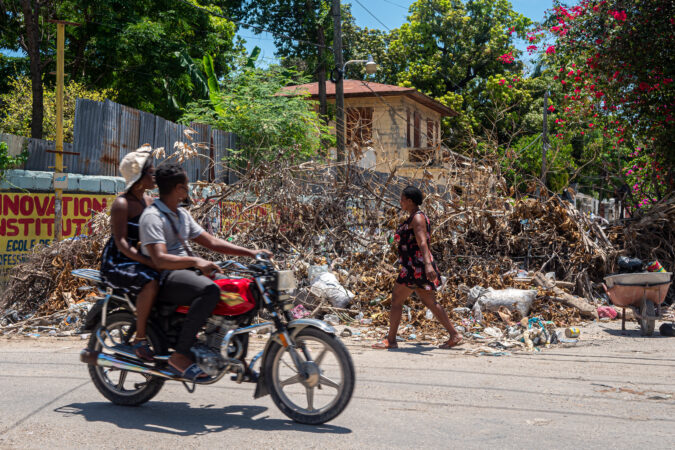
View of the cumbersome state of the premises between Ruelle Waag and Rue Capois in May 2024.
Unfavorable opinions on these initiatives are pouring in.
Sanitation in Haiti is “one of the many means used to squander money,” criticizes the head of the engineering department of the Delmas town hall, Bien-Aimé Pierre Marie Lafont.
To explain, the engineer takes the very functioning of the garbage collection sector as an example.
“If a person maintains that they removed 300,000 cubic meters of waste at a rate of 100 gourdes per meter,” says Lafont, “there is no way to justify it. And if, despite everything, they were forced to provide proof, they would only have to take the enquirer to Truitier.”
Read also : De plus en plus d’Haïtiens «cherchent la vie» dans les ordures à Port-au-Prince
Located in Cité Soleil, Truitier is a waste disposal site where several municipalities, including Port-au-Prince, Delmas, Pétion-Ville, Tabarre, and Croix-des-Bouquets, dump their waste. Its volume is colossal.
Officials avoid denouncing the crimes. “When we take the risk of telling the truth,” maintains Lucsonne Janvier, “we are sure to bother many people. This is why we generally stay silent,” he explains.

Vendors and buyers are near a pile of garbage in Lalue, in May 2024. | © Carvens Adelson/AyiboPost
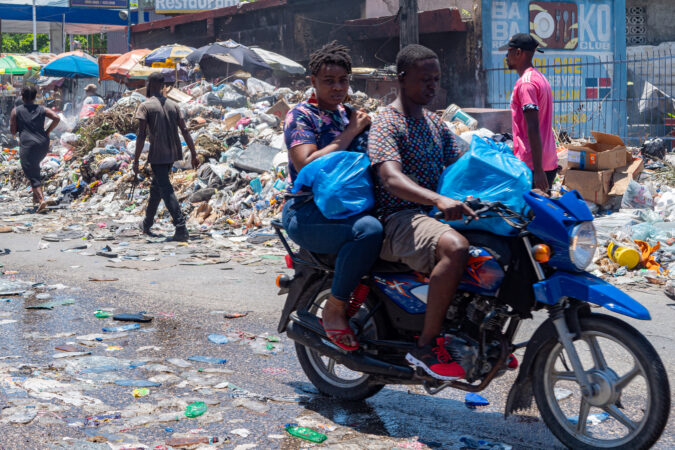
People walk past piles of garbage located very close to the Ministry of Communication in Port-au-Prince.
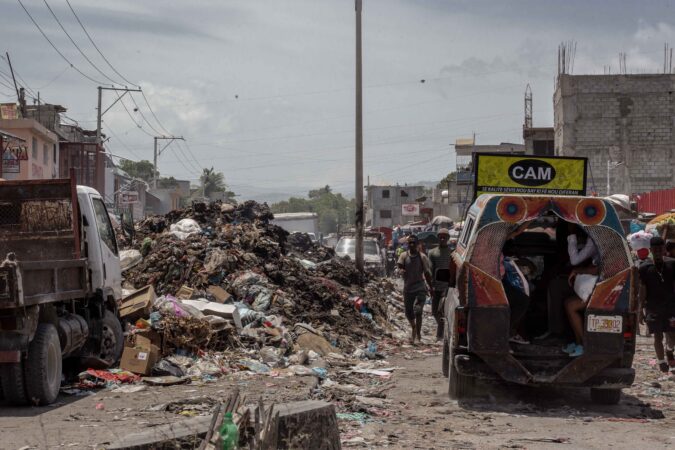
Garbage is blocking a lane on Gérald Bataille road, near the SNGRS premises, forcing pedestrians and vehicles to use the other lane exclusively. | © Jean Feguens Regala/AyiboPost
Carvens Adelson participated in this report.
Cover image: Small vendors display their goods on the piles of trash stacked at the entrance of Olympic Market.
The photos are from Carvens Adelson/AyiboPost.
Watch this AyiboPost interview with sociologist Jean Sergo Louis on the socio-political relationship of Haitians with waste:
Keep in touch with AyiboPost via:
► Our channel Telegram : Click here
► Our Channel WhatsApp : Click here
► Our Community WhatsApp : Click here







Comments